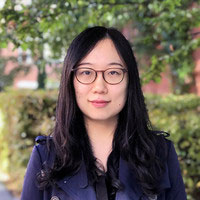Qianwen Xu new assistant professor in sustainable power systems and microgrids
NEW DIGITALISATION RESEARCHERS
The new KTH faculty member Qianwen Xu was in 2021 appointed assistant professor at the Department of Electrical Energy Engineering, Division of Electric Power and Energy Systems. Her research is focused on developing advanced control and optimisation methods to address the control, stability and cybersecurity challenges of future sustainable power systems to accommodate a high share of renewables.
What is your research area?

“My research area is sustainable power systems and microgrids. With the decarbonisation of the energy sector, I'm devoted to developing advanced control and optimisation methods to address the control, stability and cybersecurity challenges of future sustainable power systems to accommodate a high share of renewables.
Now with the advancement in digital technologies, I’m integrating AI and machine learning to design new solutions. My research works can improve the penetration of renewable energy and enhance the system stability and reliability. A few examples include sustainable and secure power supply systems for smart buildings, islands, electric transports as well as large power grids. The target is to design a cost-effective, secure and 100 per cent renewable energy system for the future climate-neutral society,” Qianwen Xu says.
What are the large research challenges in your research area and why?
“The largest research challenge in electrical power area is to guarantee the stable and secure operation of power grids with a high ratio of renewables. Electric power systems are going through a paradigm shift with the wide integration of distributed energy resources, such as solar PV, wind power, energy storage, and electric vehicles.
This paradigm shift makes the power grids complex, changing, highly stochastic and distributed, and also brings new stability and security issues. It is difficult to analyse and control such complex and stochastic grids to guarantee secure operation. Therefore, new solutions are in urgent need, and digitalisation is an enabling technology.”
If you are looking for research collaborators, what competence is important?
“As the development of sustainable power grids encounters great challenges, it requires multidisciplinary efforts. I’d like to collaborate with researchers in computer science, control theory and applied mathematics, to develop novel solutions to control the complex and stochastic grids with the aid of digitalisation.
Moreover, energy storage technologies are important to balancing power grids with a high share of renewables, and I’m happy to collaborate with researchers in chemical and materials engineering, especially in battery and hydrogen. I’m also interested in collaboration with social and behavioural sciences as energy transition requires involvement of citizens, and it is important that technical solutions can take into consideration of social impact.”
Tell us more about one of your research results and why you picked it?
“In our recent project funded by C3ai and Digital Futures, we are developing data driven control strategies for smart converters to achieve voltage regulation of sustainable power grids using deep reinforcement learning. As discussed, power grids are becoming complex, stochastic, changing and distributed with a large number of converter interfaced assets. The lack of adequate control mechanisms to regulate the voltage within a secure region is a key hindrance for decarbonisation.
Now with the ongoing digital transformation of the grid, we leverage deep reinforcement learning to train data-driven and communication-efficiently control policies, to make converters automatically learn to optimise their interactions with the complex grid environment and achieve a smooth integration of renewables. It is a good example to show how digitalisation plays an important role in improving the control of sustainable power grids.”

Lastly, what do you like with Sweden, Stockholm and KTH?
“Stockholm is a very nice city combining both modern facilities and beautiful nature. KTH is very supportive and creates a perfect environment for young faculties to grow up. I'm very proud to be a faculty at this world-leading technical university and having the opportunities to collaborate with so many smart scholars and also people from the industry.”
